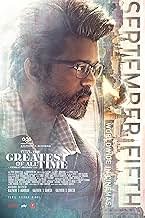‘GOAT’ Movie Review: The Joy of Storytelling Lost in a Fruitless Quest for a Winning Formula

At its core, every film revolves around storytelling, but in “GOAT,” that aspect becomes secondary once the Thalapathy-Ilayathalapathy premise is established.
“GOAT” (2.5 / 5)
Director: Venkat Prabhu
Cast: Vijay, Sneha, Prashanth, Prabhudheva, Ajmal, Mohan, Jayaram
In the first half of “GOAT,” there’s a moment when the excitement of being an Ethan Hunt-like agent, Gandhi (played by Vijay), blends with the signature irreverence of Venkat Prabhu’s filmmaking. One memorable scene shows Gandhi dangling from a skyscraper at night while taking a call from his wife, who reminds him about grocery shopping. This moment captures the essence of middle-class life, showcasing the relatable touches that initially drew audiences to Venkat Prabhu’s unique style. He has a knack for infusing unexpected humor into his films, making his characters feel more human.
As the story unfolds, particularly when Anu (Sneha) begins to question Gandhi’s Gandhian nature, it’s clear that the filmmaker is having a great time with the concept. He successfully establishes Gandhi and his family as relatable individuals. Vijay delivers a commendable performance, appearing relaxed and fully engaged, clearly enjoying his role.
During this segment, Gandhi’s family and friends travel to Thailand, where Yuvan contributes a bass-heavy remix of ‘Sorgame Endraalum’ that I found quite enjoyable. Venkat Prabhu’s clever setup for the song, along with the accompanying montage, adds to the film’s charm. The nostalgic references sprinkled throughout, reminiscent of “Ghilli,” feel fitting in this context, enhancing the film without detracting from the overall storytelling.

During these sections, the film achieves a commendable balance between humor, innuendos, and emotional depth. A standout emotional scene features Vijay and Sneha, who deliver heartfelt performances, particularly as Sneha transitions from a state of frustration to profound sorrow. This setup by Venkat Prabhu represents the strongest aspect of “GOAT” for me.
However, the film’s runtime is quite lengthy, stretching well beyond these impactful moments as it shifts between past and present. As we uncover the truth about Gandhi’s son, Jeevan/Sanjay, the film seems uncertain about how to address this serious issue appropriately. It’s not that Vijay’s portrayal of the character is erratic; rather, the film appears indecisive about Sanjay’s role. Given the warmth and seriousness established in the Gandhi-Anu household, their reunion with Sanjay feels rushed and lacks the necessary depth.
This inconsistency is particularly frustrating considering the revelations about Sanjay’s upbringing. The premise holds significant emotional potential, yet the film feels oddly detached. While the themes are present, they aren’t explored fully. As a result, Mohan’s Rajiv Menon, who is involved in a story of revenge and manipulation that entails considerable personal sacrifice, never truly becomes relatable or engaging.
Additionally, the film is filled with references to classic cinema, touching on elements from “Okkadu” and including nods to songs like ‘Unakenna’ from “Attagasam.” Despite having a poignant backstory, Sanjay is portrayed as a psychopath, and the film struggles to reconcile this portrayal with the emotional weight it attempts to convey.
Leave a Reply